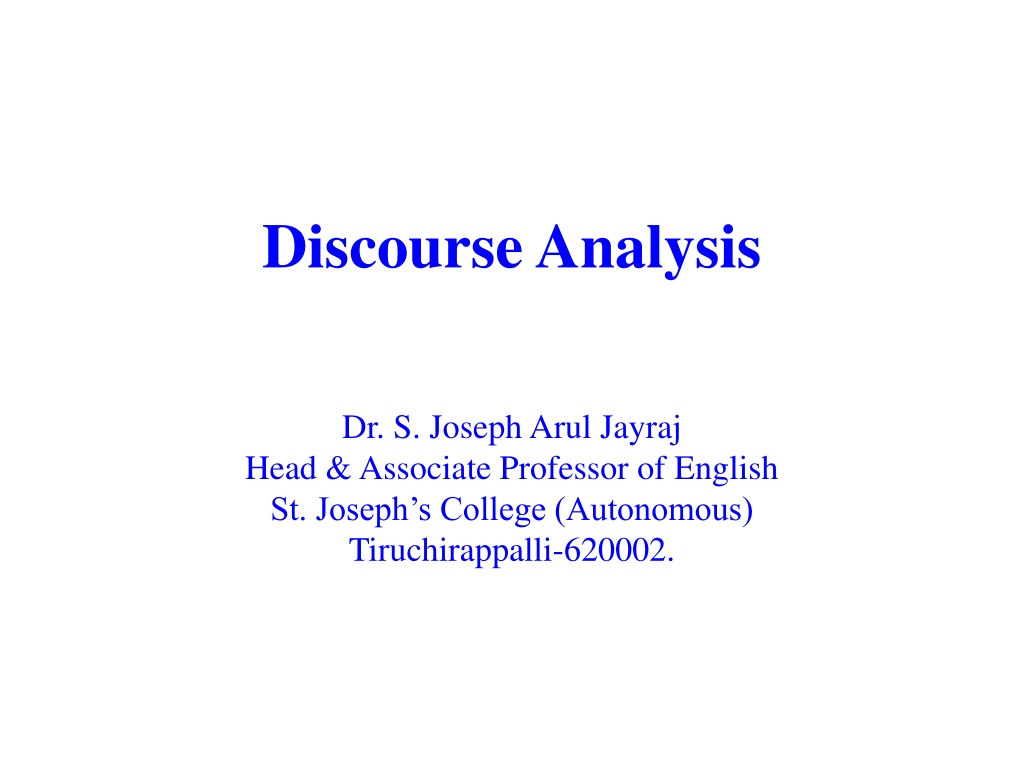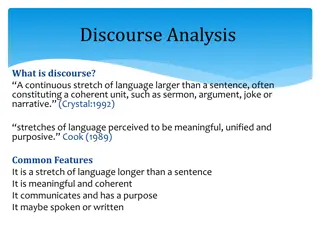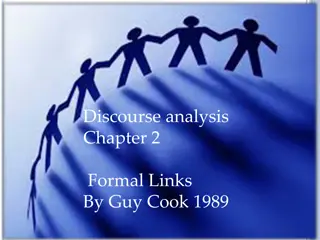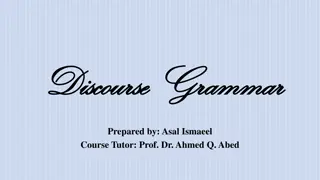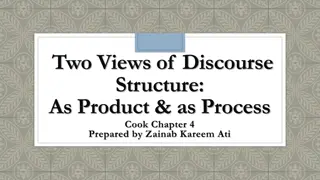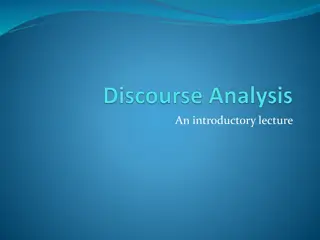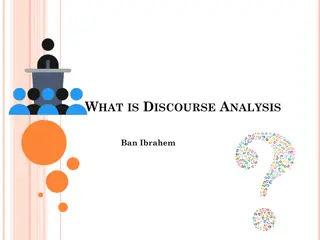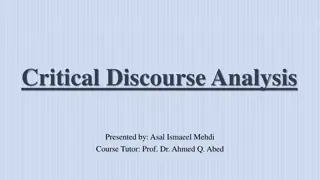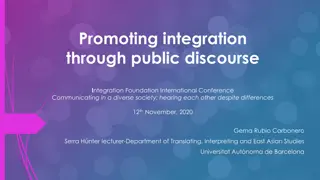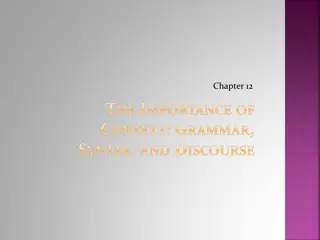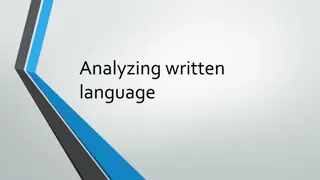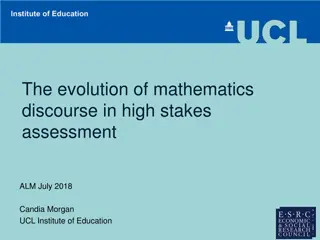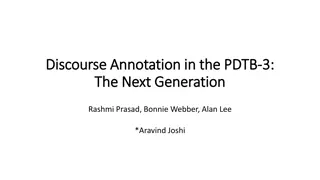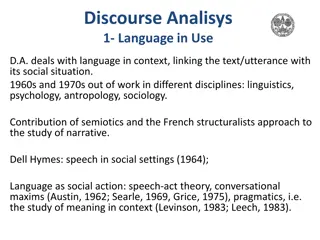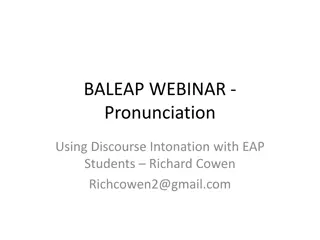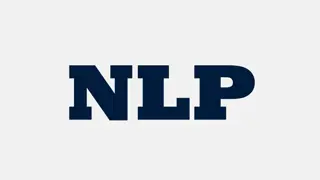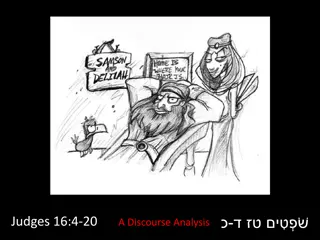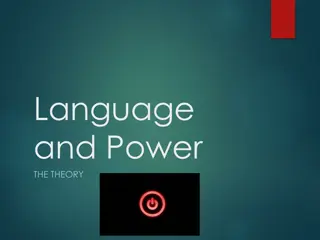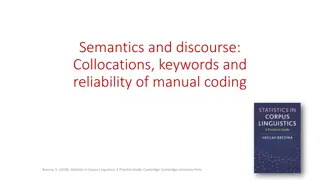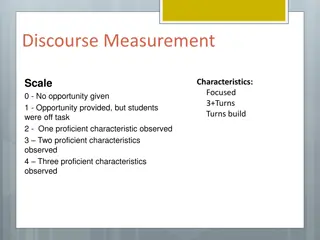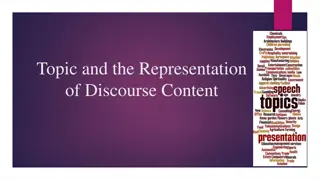Understanding Discourse Analysis: A Comprehensive Overview
Discourse analysis involves the study of language usage in different contexts, encompassing various aspects such as applied linguistics, rhetoric, and pragmatics. It aims to uncover how meanings are created, challenged, and changed through communication. By analyzing discourse, we can gain insights into social interactions, perspectives, and complexities, leading to a better understanding of ourselves and the world around us.
Download Presentation

Please find below an Image/Link to download the presentation.
The content on the website is provided AS IS for your information and personal use only. It may not be sold, licensed, or shared on other websites without obtaining consent from the author. Download presentation by click this link. If you encounter any issues during the download, it is possible that the publisher has removed the file from their server.
E N D
Presentation Transcript
Discourse Analysis Dr. S. Joseph Arul Jayraj Head & Associate Professor of English St. Joseph s College (Autonomous) Tiruchirappalli-620002.
What is a discourse? written or spoken discussion, conversation, talk, dialogue, communication, conference, debate, consultation, etc.
5 Types of Discourse Narration Description Argumentation Exposition
What is discourse analysis? (1) the study of the ways in which language is used in texts and contexts.
(2) It includes applied linguistics, conversation analysis, rhetoric, stylistics, pragmatics, and text linguistics. (3) The study of how meanings are established, used, challenged and changed (including in talk).
Why to analyse discourse? i. To understand ourselves within our social worlds and their complexity or to know about people and their social worlds. ii. To understand the varied possibilities and implications of certain meanings and world views. iii. It is interesting.
What kinds of data? a. Language data (written/spoken) is collected. b. Other kinds of evidences collected: (image of the Holy Spirit Why Pigeon & not Crow?), behaviours (Judas kissing Jesus), situations found)
Chomsky (1980) Discourse competence is part of Linguistic competence . .Single sentences: contrived (forced) by the linguist ( GEORGE likes fish, George LIKES fish, George likes FISH), within the context. .Out of context ( Is there a text in this class? ).
In Traditional Literature, context creates content; in Absurd Drama, content creates context (Waiting for Godot)
Syntactical/Structural Analysis
e.g. The lady kissed the man with spectacles . . The phrase with spectacles is the cause for ambiguity -- syntax or structure. . It is not clear whether the lady is using spectacles to kiss a man or she kisses a man who is wearing spectacles or the lady who is wearing spectacles kisses the man.
TWO SOVIET SHIPS COLLIDE, ONE DIES
ENRAGED COW INJURES FARMER WITH AX
DEALERS WILL HEAR CAR TALK AT NOON
The best way to lie is to tell the truth . . . carefully edited truth. ANONYMOUS
Going to church doesnt make you a Christian any more than standing in a garage makes you a car. BILLY SUNDAY
If you steal from one author, its plagiarism; if you steal from many, it s research. WILSON MIZNER
You spend the first 2 years of Children s life teaching them to walk and talk. Then you spend the next 16 telling them to sit down and shut-up. ANONYMOUS
Women who seek to be equal with men lack ambition. MARILYN MANROE
To err is human, to blame it on somebody else shows management potential. ANONYMOUS
Before I got married, I had six theories about bringing up children; now I have six children and no theories. JOHN WILMOT
An archaeologist is the best husband a woman can have; the older she gets the more interested he is in her. AGATHA CHRISTIE
Politicians and diapers have one thing in common. They should both be changed regularly, and for the same reason. ANONYMOUS
At every party, there are two kinds of people those who want to go home and those who don t. The trouble is, they are usually married to each other. ANN LANDERS
. Example, I love you. .It is a fragment. .The structure of the text reveals one s repressed desires.
b. It brings forth the opposition between wish & power . c. Uttered by a person who tries to impose his wish / will over the other person fulfilling the satisfaction of his/her repressed desires in convincing the other person.
d. Polarities of I and you: The I in the UPPER CASE and the you in the lower case denote that the I is much bigger, much more important, and much more power- driven than you .
e. The I is the activator of love and the you is the passive receptor, who has no chance of rejecting or negating the proposal in this power game.
f. Not naturally produced, proposed & conveyed but it is posited (assumed) by an arbitrary act of language which is taken for granted.
g. Self-reflexive love where the I is forefronted in the background of the you fulfilling the desires of I . h. I uses the you to fulfil its repressed desires under the camouflage of so-called love.
i. The love I has is narcissistic and so it is not love which it has for the you . j. This love is non-love , defective love assigns chiefly a negative value in relation to the I .
k. I is not inclusive but exclusive of you . l. The real meaning of I love you is not the love the I has for you , but it is I love I (the love the I has for I ).
m. Self-love culminates to the realization that the I has something other than love for you . n. In some extreme situation (in the case of rape), it turns out to be hatred for the you as soon as the repressed desires of the I are fulfilled by the you .
Criticism on discourse analytic research: i. Deterministic? (No, it is about how meanings are used and contested.) ii. Just words? (Not just words, but arrangement of word(s) in a discourse material.)
Zelling Harris Discourse (1952) is a combination of sentences . Example, Dialogue: Principal: What does he look like? Stupid? or Intelligent? PA: Fairly intelligent I d say, Sir. Principal: Good! Then he is not a member of NAAC. Show him in.
Text=verbal record of a communicative act (product). Discourse= the dynamic process of creating the text (process). In Discourse analysis, meaning is not seen as a static, abstract notion attached to words or sentences, but a dynamic interactive force constructed by the mind from language in context.
Harold Bloom: There are no texts, but only interpretations . So, a text is foregrounded in the background of context because words cannot interpret themselves. They can be interpreted only in contexts.
Try to Interpret the Following Poem: I smoke, you don t; I smoke, you don t; I smoke, you don t; u between s, only ashes and smoke!
